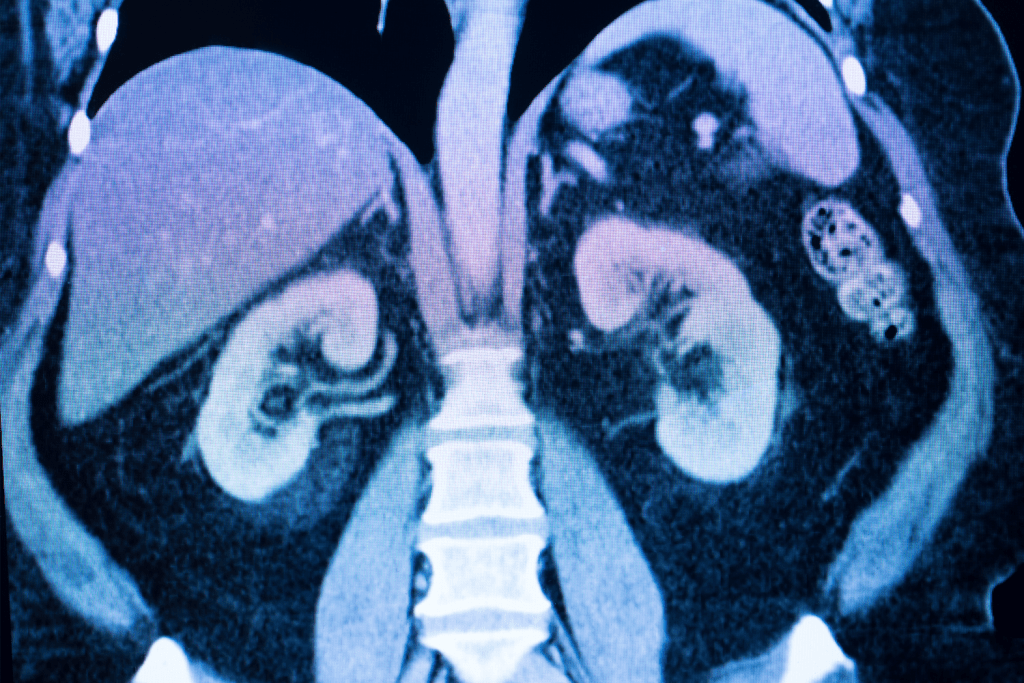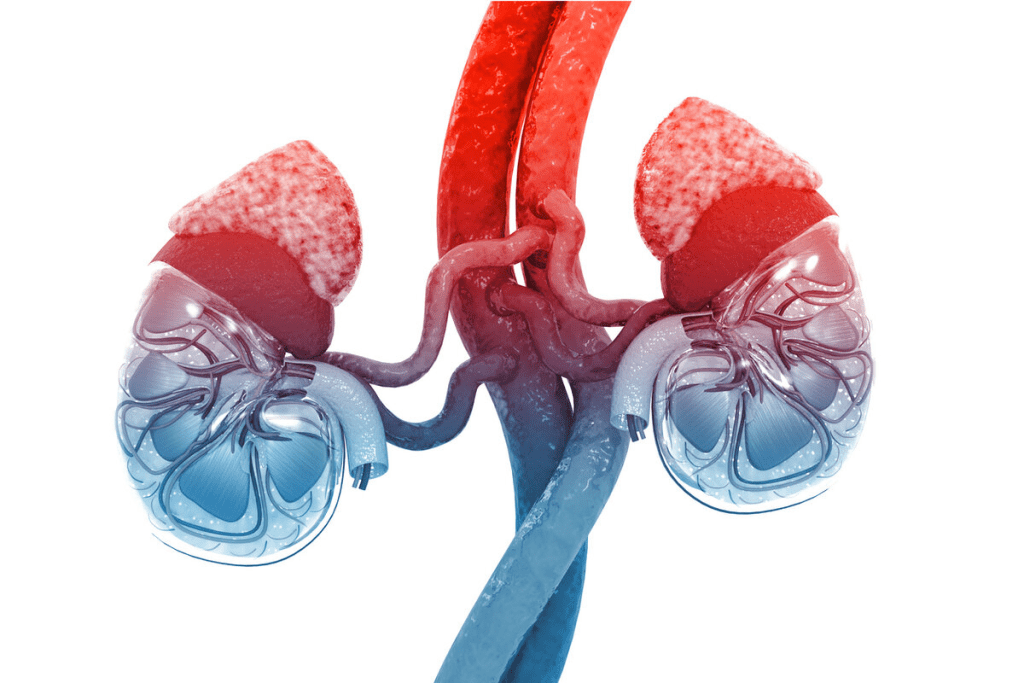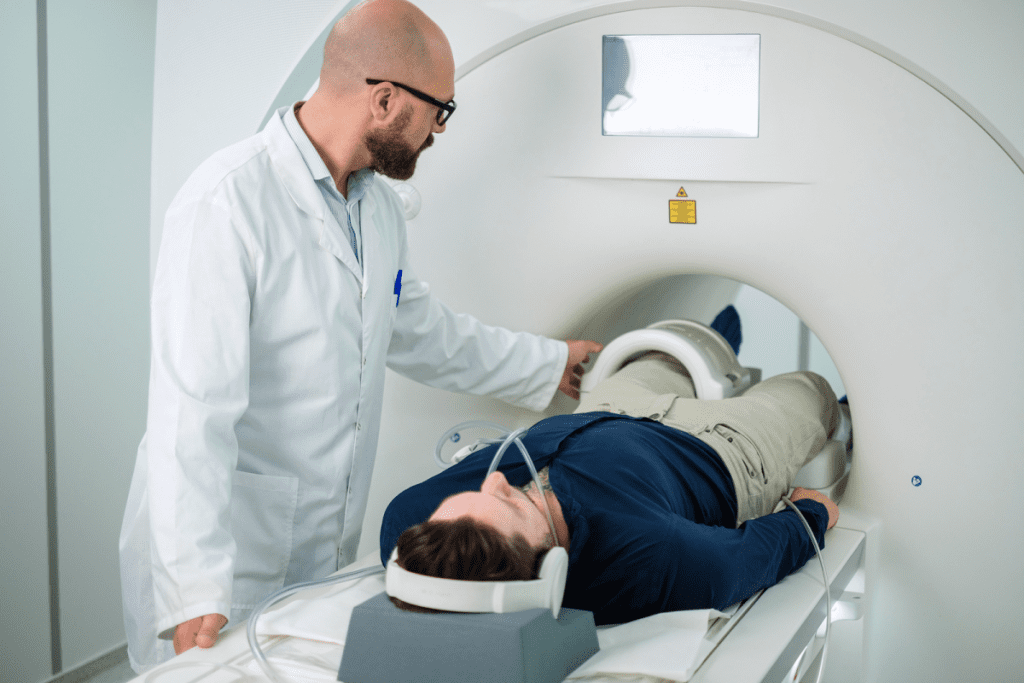Last Updated on November 25, 2025 by

A kidney MRI is a noninvasive test that shows detailed images of the kidneys. It helps find many kidney problems. The time it takes for a renal MRI scan can change, but it usually lasts between 30 and 60 minutes.
Several things can affect how long the scan takes. These include the type of scan, if contrast agents are needed, and the technology used.
MRI scans of the kidneys give a detailed look at the kidneys’ structure and any problems. They help doctors make accurate diagnoses and plan treatments. This method is great for showing how the kidneys work and any issues they might have.
Kidney MRI scans take high-quality pictures of the kidneys. Doctors can see how they look and work. This is ketoor spotting problems and understanding how serious they are.
The detailed imaging provided by MRI helps doctors plan the best treatment. This makes sure patients get the care they need.

Kidney MRI scans are great at finding different kinds of problems, like tumors, cysts, and blood vessel issues. The high sensitivity of MRI makes it a top choice for finding kidney diseases. Early detection means doctors can act fast.
Kidney MRI scans are safe because they don’t hurt and don’t use radiation. This is good news for patients and doctors. MRI scans do not involve radiation, which lowers the risk of harm from radiation.
This is very helpful for people who need to have many scans over time.
In short, kidney MRI scans are a powerful tool for diagnosing kidney problems. They offer detailed images and are safe and non-invasive. Their ability to find many types of kidney issues makes them very important in kidney care.
A kidney MRI procedure usually takes a certain amount of time. But different things can change how long it lasts. The exact time depends on the specific steps and whether contrast agents are needed.

The usual time for a kidney MRI scan is 30 to 60 minutes. This time, let’s doctors get a full view of the kidney’s structure and how it works.
Some things can make the scan last up to 90 minutes. For example, high-resolution or multi-phase studies need more detailed pictures, which take longer. Using contrast agents, like in an MRI with contrast kidney procedure, also adds to the time.
How long the procedure takes can also depend on the patient. Patients with certain health issues or trouble staying calm during the scan might need more time. The complexity of the case and extra imaging needed can also affect the length of the MRI of the kidneys procedure.
Knowing these factors helps set patient expectations and get them ready for the procedure. It’s key for patients to follow the pre-procedure instructions well. This helps avoid delays or problems.
Knowing about the different kidney MRI scans helps set the right expectations for the procedure’s length. These scans are not all the same. Each one is designed to give specific details about the kidneys.
A basic anatomical kidney MRI gives detailed images of the kidney’s structure. This scan usually takes 30-45 minutes. It’s a key tool for checking the kidney’s anatomy.
A renal MRI with contrast uses a contrast agent to highlight certain kidney areas. This scan can take 45-60 minutes. The contrast agent helps spot different tissues, which is great for finding tumors or vascular issues.
For detailed checks, multi-phase and high-resolution studies are used. These scans can last from 60 to 90 minutes. They’re great for looking at complex kidney problems, like vascular diseases or tumors, by showing more of the kidney’s structure and function.
For certain kidney issues, MRA kidney protocols or other MRI special scans are used. These scans are made for the patient’s specific needs and can vary in time. They’re vital for getting the right diagnosis and treatment plan.
Some high-resolution or multi-phase studies might last up to 90 minutes. The exact time depends on the scan’s complexity and the patient’s health. Knowing these differences helps prepare for a kidney MRI.
To have a comfortable and effective kidney MRI, you need to prepare. Knowing what to do can make the experience less stressful. It helps everything go smoothly.
Your doctor might ask for blood tests before your MRI. These tests check how well your kidneys work. They’re important if you’re getting an MRI of the kidneys with contrast.
The tests look at creatinine and eGFR levels. These show how healthy your kidneys are. Your doctor will use this info to plan your MRI.
Your doctor might tell you what to eat and avoid before your MRI. You might need to fast or skip certain foods and meds. This is to make sure the scan works right and you’re safe.
It’s very important to follow these rules. They help make sure your MRI results are accurate and you’re safe during the test.
Get to your MRI appointment at least 30 minutes early. This gives you time to check in, fill out papers, and get ready for the scan.
You’ll likely change into a hospital gown and remove metal items. This is to keep the MRI machine working well.
Wear comfy, loose clothes without metal parts on the day of your MRI. Don’t wear jewelry, glasses, or anything with metal. These can mess with the MRI.
By knowing these tips, you can make your kidney MRI go well. It will be a smoother experience for you.
Knowing what to expect during a kidney MRI scan can make it less scary. The process includes several steps, from checking in to the actual scan and after-care.
When you arrive, you’ll check in at the radiology department or MRI suite. You’ll need to fill out paperwork and share your medical history. It’s best to arrive 30 minutes early to get this done.
You might need to change into a hospital gown to avoid metal objects interfering with the MRI. You’ll also have to remove any jewelry, glasses, or metal items.
After getting ready, you’ll lie on the MRI table, usually on your back. The table will then move into the MRI machine. The MRI technologist will make sure you’re comfortable and in the right spot for the scan.
In some cases, a contrast agent might be given through an IV to improve image quality. This is often needed for an MRI with contrast kidney scan.
During the scan, you’ll need to stay very quiet and lie very straight on the table. The MRI machine makes loud noises. You might get earplugs or headphones to help with this.
The scan usually takes 30-60 minutes. This depends on how complex the scan is and what it needs to show.
Once the scan is done, you’ll be taken out of the machine. If a contrast agent was used, it will be removed. You can usually go back to your normal activities right away.
The MRI results will be looked at by a radiologist and then sent to your doctor. You’ll usually get the results in a few days to a week.
Understanding the steps of a kidney MRI scan can help reduce anxiety. Knowing what to expect makes the whole process easier and more comfortable.
There are many ways to check the kidneys, and knowing the differences is key to a correct diagnosis. Kidney MRI is one of these methods, each with its own benefits and uses.
MRI and CT scans are both used to check the kidneys. But they are different. MRI shows soft tissues better than CT scans. This makes MRI great for looking at complex kidney structures and finding problems like tumors or cysts.
CT scans are quicker and easier to find than MRIs, but they use radiation and don’t show soft tissues as clearly. The choice between MRI and CT scans depends on what the doctor needs to see and the patient’s situation.
MRI and MRA are both used for kidney checks, but they focus on different things. MRI looks at the kidney’s structure, while MRA checks the blood vessels. MRA is best for finding problems with the blood vessels in the kidneys.
Finding kidney stones is a common need in kidney checks. MRI is not the first choice for this because it can’t see calcified structures well. But specific MRI sequences can spot indirect signs of kidney stones, like signs of blockage.
Doctors often choose a kidney MRI for some conditions because it’s non-invasive and doesn’t use radiation. MRI is best when you need detailed images of soft tissues, like in complex kidney tumors or cystic diseases.
The decision to use kidney MRI depends on the patient’s condition, what the doctor needs to see, and MRI’s benefits over other methods.
Knowing what to expect during a kidney MRI can help reduce anxiety. It makes the experience more comfortable. By understanding the process and what you need to do before, you can prepare better.
A kidney MRI usually lasts between 30 and 60 minutes. This depends on the scan type and your condition. To feel more comfortable, wear loose, comfy clothes. You might also get earplugs or headphones to block out the MRI machine’s noise. For more details on preparing for a kidney MRI.
Being well-prepared and informed can greatly improve your experience. Follow the guidelines, like fasting for 4-6 hours before if needed. Also, remove any metal objects. This helps ensure a smooth and accurate kidney MRI scan.
A kidney MRI scan usually lasts between 30 and 60 minutes. The exact time can change based on the scan type and if contrast agents are used.
MRI gives detailed images of the kidney’s structure. MRA focuses on the blood vessels to diagnose vascular conditions. It’s often used for kidney vascular diseases.
While MRI can spot some kidney issues, it’s not the best for finding kidney stones. CT scans are usually better for this.
Blood tests are needed before an MRI with contrast to check kidney function. This ensures the contrast agent is safe. It’s key for those with kidney problems.
To get ready for a kidney MRI scan, you might need blood tests and follow certain dietary and medication rules. Arrive early for the pre-scan steps. Wear comfy clothes and remove metal accessories.
MRI offers detailed kidney images without radiation, making it safe and non-invasive. It’s great for spotting tumors, cysts, and vascular issues.
The time to get MRI scan results varies. It depends on the healthcare provider and the complexity of the diagnosis. Usually, results are ready in a few days.
Some metal implants, like pacemakers, might not be safe for MRI scans. Always tell your healthcare provider about any metal implants before a kidney MRI scan.
A basic anatomical MRI shows the kidney’s structure in detail. A contrast-enhanced MRI uses a contrast agent to highlight specific areas, like tumors or vascular issues.
Subscribe to our e-newsletter to stay informed about the latest innovations in the world of health and exclusive offers!